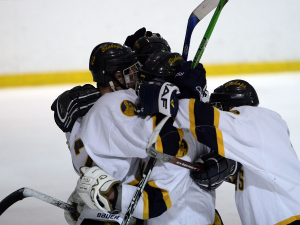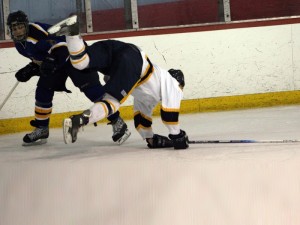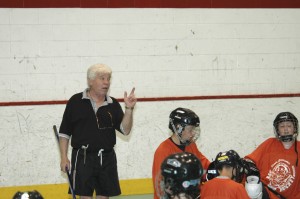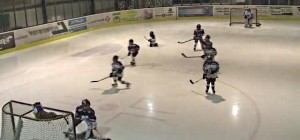A lot has been said over recent years about the topic at hand. It came to mind just recently, though, as an article circulated around social media sites, that in reference to modern day NHL coaches tending to be so-called control freaks.
So, because I very much dislike the use of such expressions -- at least without adequate explanation, I thought I'd address the subject here for my member friends.
-- Dennis Chighisola
The Hockey Coach as a Control Freak
As a start, let me suggest a reason why older or higher level team coaches tend to dwell so much on systems, and at the same time offer a very sound reason why a lot of their systems concentrate mostly on team defense. Both, I think, contribute quite a lot to the hockey coach as a control freak...
Ice hockey, of course, is a team game. And, as such, a roster full of individuals must be pulled together in sort of a united front. Or, if you'll recall the old adage, "The whole is greater than the sum of its parts," you should appreciate what the hockey coach is attempting to do.
 Now, I've never heard anyone else describe things the way I will right now, but I'm going to suggest that a team's offensive potential is pretty close to a known quantity. Why so? It's because the offensive output of each individual player on a team can be predicted, at least within reason. In other words, this guy is a potential 30-goal scorer, that guy is good for around 25-goals per season, this guy has hands of stone and is unlikely to contribute many goals, and so forth. Sure, some extra effort and some tinkering with the X's and O's can increase team offense -- a bit, but most likely not an awful lot.
Now, I've never heard anyone else describe things the way I will right now, but I'm going to suggest that a team's offensive potential is pretty close to a known quantity. Why so? It's because the offensive output of each individual player on a team can be predicted, at least within reason. In other words, this guy is a potential 30-goal scorer, that guy is good for around 25-goals per season, this guy has hands of stone and is unlikely to contribute many goals, and so forth. Sure, some extra effort and some tinkering with the X's and O's can increase team offense -- a bit, but most likely not an awful lot.
With that, a coach might feel his team will average x-goals per game, which means that his or her team is only going to win if its goals-against are under that number. And, while I'm hoping you'll agree: that offensive output is mostly God-given, and a result of years and years of skill work, the goals-against are most often based on hard work, discipline and playing together -- in some sort of defensive system.
Notice I said earlier that this stuff is usually on the minds of "older or higher level team coaches". For them -- maybe beginning in high school, and continuing up the ladder through Juniors, college and into the pros, winning becomes more and more important. And, the higher we move up that ladder, the more probable it is that the coach's job is on the line based on whether his or her team is winning or losing. (I believe an NHL head coach just got canned, only a couple of weeks into the new season. Ugh.)
That said, I'm praying that coaches of younger players will get that "in total control" thing out of their heads. No, that's not the place for the hockey coach to be acting like a control freak.
I'm not saying that the youngest teams don't need some structure, plus a chance to learn some basic playing principles -- hey, I've written a book to help coaches of young ones teach the game. Just remember, though, that the more discipline required in a playing system, the more it tends to inhibit offensive creativity, and the more it tends to stunt the players' growth.
 I'm thinking back now to a decade or more ago, when the NHL's New Jersey Devils implemented the neutral zone trap... Man, did a great many of their players hate it. I recall some of their top scorers even wanting off the team in fear they're stats would suffer in such a defense-oriented style of play. And, when we're talking about offensively talented pros, we're talking about their stats equating to their earning power.
I'm thinking back now to a decade or more ago, when the NHL's New Jersey Devils implemented the neutral zone trap... Man, did a great many of their players hate it. I recall some of their top scorers even wanting off the team in fear they're stats would suffer in such a defense-oriented style of play. And, when we're talking about offensively talented pros, we're talking about their stats equating to their earning power.
Then, expressing yet another personal feeling here... I honestly believe that a good many pros still play the game as much for fun as they do for the pay. Sure, many of them make millions. They still have some of the kid in them, however, and I don't doubt they once in a while envision themselves out chasing pucks on childhood lakes, rivers or backyard rinks. My point here: Even pros want to enjoy playing the game.
I'm also thinking far back to a coaching symposium I attended many years ago, in Windsor, Ontario, Canada. The keynote speaker was the great Scotty Bowman, who shared with all those in attendances his experiences as a first year head coach of the Montreal Canadiens.
What I came away with was that more experienced advisers told him that his success on the job would likely boil down to his success in handling the budding young star he'd just inherited -- the soon to be great Guy Lafleur.
It's probably been 20-years since I heard Bowman's talk, but I seem to recall those advisers telling him that Lefleur was so fast that others had difficulty playing with him. And like a lot of other gifted players, I'm guessing that The Flower also made passes or other plays that caught his teammates off guard. (Sound familiar -- to those of you who currently coach a young hot-shot?)
The point I think Bowman was trying to make -- and the one I'm surely trying to make with member coaches -- is that it's worth the effort to find a way to help the young star succeed. Personally, I think any team is better with than without that special kind of player.
I relate that story -- or that line of thinking -- to introduce the idea that most teams have at least one super star, probably another two or three players with the ability to really shine, and then a host of skaters in support.
 In a way, I liken a team to an orchestra with a head coach as the maestro... For sure, the huge ensemble has to be playing in the same key, while with a swipe of a baton the oboes get to shine, the tuba gets its chance to chime in, and then maybe the strings get to take center stage. Funny thing, though -- and despite the importance of the whole group needing to play together, consider this... My guess is that, if you ask any orchestra or band leader if it would matter losing his top celloist, he'd snap right back with, "Hell, yes!" Ha... I feel the same as a head hockey coach, realizing full well that a team composed of just lunch bucket guys can struggle without a game breaker or two mixed in.
Okay, having now exhausted my knowledge of orchestras and such -- ;) , let me say again, that a hockey head coach is very much like the maestro. He or she has to get everyone playing in the same key, or buying into some semblance of a playing system, while at the same time needing the star players doing what they can do best, and doing it when most other players just can't.
If you see where I've been going with this, it's to suggest that a team does need structure; the question is, just how much.
In a way, I liken a team to an orchestra with a head coach as the maestro... For sure, the huge ensemble has to be playing in the same key, while with a swipe of a baton the oboes get to shine, the tuba gets its chance to chime in, and then maybe the strings get to take center stage. Funny thing, though -- and despite the importance of the whole group needing to play together, consider this... My guess is that, if you ask any orchestra or band leader if it would matter losing his top celloist, he'd snap right back with, "Hell, yes!" Ha... I feel the same as a head hockey coach, realizing full well that a team composed of just lunch bucket guys can struggle without a game breaker or two mixed in.
Okay, having now exhausted my knowledge of orchestras and such -- ;) , let me say again, that a hockey head coach is very much like the maestro. He or she has to get everyone playing in the same key, or buying into some semblance of a playing system, while at the same time needing the star players doing what they can do best, and doing it when most other players just can't.
If you see where I've been going with this, it's to suggest that a team does need structure; the question is, just how much.
In a way, it probably takes some "feel" for a coach to know how much to rein in a team, and how much to turn the players loose. For sure, it's a delicate balance.
 Without question, I'd turn an entire squad of very young kids loose, but at the same time gradually teach them certain basic hockey principles that would have them understanding a little about individual and team defense, as well as the smart choices that might be made on the attack.
Without question, I'd turn an entire squad of very young kids loose, but at the same time gradually teach them certain basic hockey principles that would have them understanding a little about individual and team defense, as well as the smart choices that might be made on the attack.
If there's a problem with my line of thinking, I'd say it's a shame if Squirts/Atoms, Pee Wees and Bantams didn't get the benefits to the approach I just explained in that last paragraph. For, I'd love to see them still turned loose to develop their creativity and foster their love of the game, while also teaching them more and more about smart playing principles.
Then, as I said earlier, high school, Junior, college and pro coaches are at least somewhat under the gun to win. That's where you're apt to see coaches be more controlling, and the playing systems being a lot stricter. Still, as Bowman might suggest, those teams still need their stars, and they need them to play to their utmost. Ya, even at our game's highest level, there's a danger in the hockey coach as a control freak.
In closing, I hope members know why I can't be too specific about this topic. As I said earlier, there really is a delicate balance between forcing discipline and turning the players loose. As I've also hinted, each of our players needs to be treated the same and differently at the same time. Some of this comes from experience, for sure. But I'm hoping members are just a bit wiser in this area from being forced to think about it a little more right now.